WE CAN REU Provides Minority Students an International Experience, Research at the Intersection of Engineering and Agriculture
“We really tried to think outside the box to make sure they had a really unique and well-rounded experience.” – Michelle Green, WE CAN Co-PI
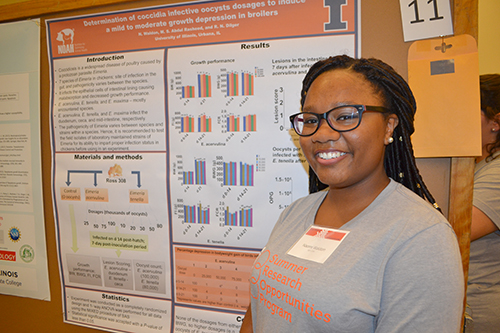 WE CAN REU participant, Naomi Waldon, with her poster.
WE CAN REU participant, Naomi Waldon, with her poster. July 23, 2018
The six minority undergraduate students who participated in the USDA-funded WE CAN (Wildlife Engineers Co-managing Agriculture in Nature) REU (Research Experience for Undergraduates) spent the summer of 2018 learning what conducting research is like. However, because WE CAN was a two-summer program, this summer’s research opportunity followed on the heels of last summer’s 4-week trip to South Africa where participants collaborated with South African students to do ag-related engineering projects.
According to Agricultural and Biological Engineering Assistant Professor and Co-PI Paul Davidson, the focus of WE CAN was to recruit underrepresented minorities and train them for careers in agriculture. Of the six WE CAN fellows, three are African American, and three are Hispanic. And it just so happens that all six are female. “That wasn’t on purpose,” qualifies Co-PI Michelle Green, a Research Assistant Professor in Animal Sciences, “but they were our best matches for the program.”
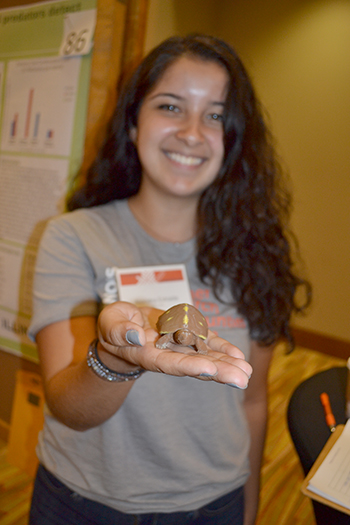 Illinois student Alondra Estrana, a rising junior in the Department of Natural Resources and Environmental Science, shows off the 3-D printed "turtle" she used in her research.
Illinois student Alondra Estrana, a rising junior in the Department of Natural Resources and Environmental Science, shows off the 3-D printed "turtle" she used in her research.
Of the members of the 2017–2018 cohort, two are University of Illinois students; two are from Northeastern Illinois, a Hispanic-serving institution; and the remaining two are from Tuskegee University, an HBCU (Historically Black College or University). Since WE CAN is a four-year grant, the co-PIs also hope to recruit two students from Parkland College for the second two-year cohort.
According to Green, the project name pretty much sums up her collaboration with fellow co-PI, Paul Davidson:
“Paul is an agricultural engineer, and I am a wildlife biologist. So when we brought our two fields together, that’s where we’re working—at the interface of agriculture and engineering.”
Green’s research focuses on wildlife mating systems and population genetics. Davidson describes his as water quality in agricultural systems—reducing the transport of pathogens from animal facilities and nutrients and pesticides from the soil in fields via water.
Also unique about WE CAN is that it’s a two-year program, which all six fellows committed to. Davidson explains that he and Green were nervous about whether the fellows would actually come back for a second summer. “So retention was a concern,” he admits, “but we have 100% retention, so we think they must see value in it.”
Even more unique is that for the first summer’s 10-week program (2017), after the participants spent six weeks on campus for orientation and training, they then traveled to South Africa for four weeks.
Regarding last summer’s program, during the participants' time on campus, the PIs tried to expose them to as many aspects of engineering, agriculture, and wildlife as possible. So along with some labs and team-building activities, they took them on a lot of field trips, most of which were a lot further than just across town. For instance, they visited an exotic cat park in Indiana, which featured lions and tigers (no bears, oh my!), and a wolf park in Lafayette, Indiana. They visited the Fair Oaks Farm, one of the largest dairy farms in northwest Indiana. Students learned how ethanol is produced during a visit to an ethanol plant,. They did a nature walk at Allerton Park. “A lot of them are from cities—Chicago, Atlanta—so they didn’t know much about agriculture,” Davidson says.
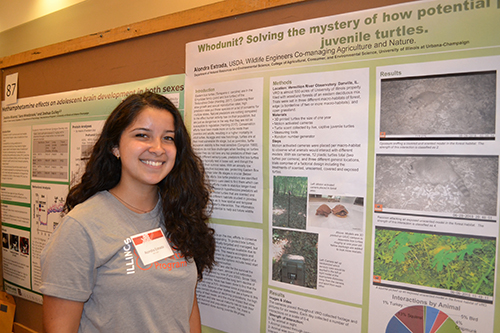 WE CAN REU participant, Alondra Estrada, with her poster about her turtle research.
WE CAN REU participant, Alondra Estrada, with her poster about her turtle research. In fact, a lot of the activities scheduled for the first summer actually came about as a result of one-on-one meetings with participants. Davidson shares how they came up with these activities. They’d ask questions like, “Coming into this, if there’s one thing you really think and expect that you’re going to do, what is that one thing?” If one of the students said, “‘I’m pretty sure we’re going to see beef cattle or something, right?’ Davidson or Green would respond, ‘Yes!’ We were thinking along the lines of what they were interested in and then would try and make the opportunity happen so they could all visit these different things.”
For instance, one thing city kids have probably never done is drive a tractor. So they took them out one afternoon and let them drive one. “So, I rode with them,” Davidson qualifies. “We didn’t just turn them loose. While I was riding with them, I found out that either two or three of them had never driven a car before. They didn’t have a driver’s license, so for them to drive a tractor, that’s pretty cool.”
The participants also met with different faculty on campus as a way to start matching them with their advisors for the summer of 2018. Students were to investigate research areas in which they were personally interested that might help move them forward in their careers. Plus, in preparation for their trip to South Africa, participants took a course to learn about the history and culture of South Africa.
The pièce de résistance for summer 2017, of course, was travelling to South Africa for four weeks. Once there, the REU fellows were teamed up with South African students, working jointly on engineering projects similar to senior-level capstone design projects. The projects were relevant to South African agriculture—things that we in the US might consider low-tech, but are needed there, such as a pedal-powered machine to clean small grains, or a plastic bottle crusher or chopper.
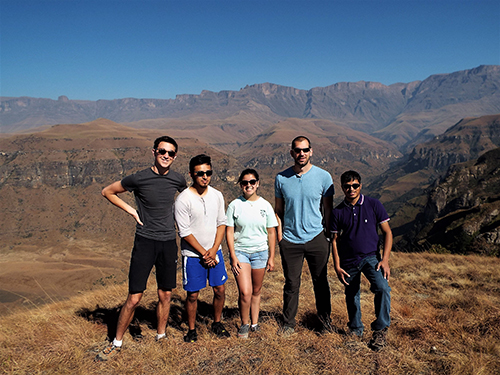 WE CAN REU participants with Paul Davidon (second from the right) in South Africa. (photo courtesy of Paul Davidson)
WE CAN REU participants with Paul Davidon (second from the right) in South Africa. (photo courtesy of Paul Davidson)While the engineering projects were the main emphasis in South Africa, it wasn’t all work and no play. On weekends, they took excursions which included wildlife and nature type things. They went to game parks, where they saw elephants, lions, zebra, even a cheetah. They went up in the mountains for a weekend, where they went hiking. “It was kind of a getaway,” Davidson admits. “I don’t think phones worked up there, so it was just a very peaceful. relaxing weekend.”
The field trips and the trip to South Africa components were added based on the recommendation of many folks who told the PIs that underrepresented students often don’t have the money to travel abroad or do day trips.
“But exposing them to that actually opens up a lot of opportunity for personal growth, and their own confidence, and being able to independently navigate the world.” Green explains.
The second summer, 2018, was devoted to research. The 8-week research program ran from May 29th through July 20th and ended with each student presenting a poster or oral presentation about their research in the campus-wide, Illinois Summer Research Symposium. Unlike last summer’s South Africa projects, which focused on third-world country interventions, Davidson claims this summer’s program was “pretty high-level research.”
For instance, one fellow, Erin Holland, worked with a faculty member in Vet-Med doing more of a human health project—looking at arsenic in human health samples. Because she’s very interested in human health in extension and talking to people about health, this was the perfect project for her; in fact, she traveled to Florida to collect samples and talk to people.
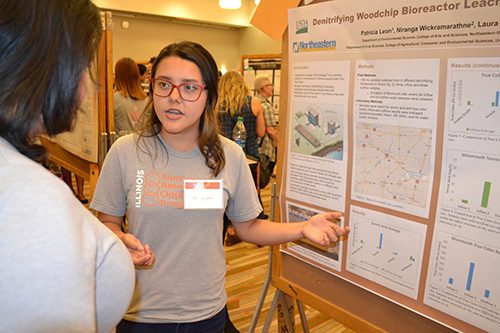 Patricia Leon explaining her research at the Illinois Summer Research Symposium.
Patricia Leon explaining her research at the Illinois Summer Research Symposium. Another student, Patricia Leon, a rising senior at Northeastern Illinois University, worked with Crop Sciences professor, Laura Christianson, who was trained as an agricultural engineer, to analyze a specific type of agriculture drainage practice called nitrogen removing or de-nitrifying wood chip bioreactors.
Hoping to come to Illinois for graduate school, Leon reports, "Because of the WE CAN program, I actually got to be in the department that I want to be applying into and got to do research with a professor."
Another WE CAN undergrad was Alisha Weatherspoon, a rising junior in Agricultural Engineering at Illinois. She’s always been interested in water quality, so working in Co-PI Paul Davidson’s lab doing a study about the retention of the herbicide Roundup in ground water was a perfect fit for her, She reports “Just seeing things in the news about poor water quality in different places, and wanting to see if I can do something about it.”
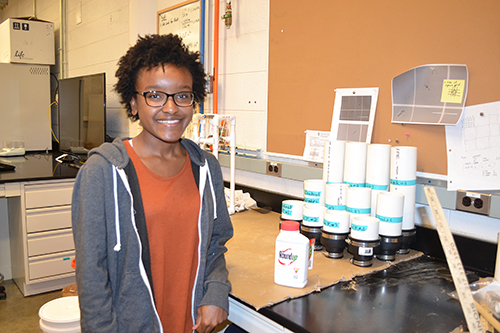 WE CAN REU participant, Alisha Weatherspoon by some of the materials she used in her research.
WE CAN REU participant, Alisha Weatherspoon by some of the materials she used in her research.Weatherspoon reports that last summer’s trip to South Africa was amazing, calling it one of the most wonderful experiences she’s ever had. “Combining a project that I worked with hands on—my first project that I got to help plan out and then actually do it—and going on excursions in South Africa is a good combination!” Her South African project was a lab-scale hydropower system that used the pump as a turbine. She and her South African counterpart generated enough electricity to light up about six lightbulbs.
Weatherspoon believes participating in WE CAN over the last two summers has had a positive impact on her skill set. “I think both of these summers have really developed my problem-solving skills and my skills as an engineer overall, I guess. Teaching me how to learn I guess.”
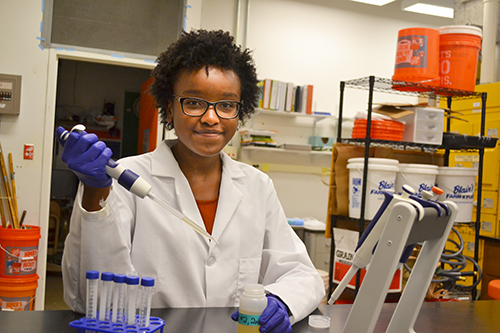 Alisha Weatherspoon conducts research in Paul Richardson's lab on water quality.
Alisha Weatherspoon conducts research in Paul Richardson's lab on water quality. In fact, based on her WE CAN experience, she's hopeful that she'll be involved in research down the road.
“I really enjoy doing the research. I hope that my job in the future incorporates some research into it. It was a good experience…I prefer being hands-on with research instead of just learning in a class environment,” she acknowledges. Weatherspoon says that her dream job is to work with the NRCS (Natural Resources Conservation Service) or the EPA after she graduates.
Another unique aspect of WE CAN was the emphasis at the intersection of engineering and agriculture. How did Davidson and Green, with such disparate research areas, come to collaborate on an REU? The campus could only submit three proposals to the USDA's (United States Department of Agriculture) limited submission REU, so the nine people interested in submitting were asked to consider collaborating. “So I contacted Paul,” Green admits, “and I was like, ‘I know we don’t know each other, but…’
Ironically, it was their somewhat disparate research which intrigued the USDA. “Which is what made the program pick us,” Davidson explains.
Davidson stresses that when people from diverse fields work together, it often strengthens the research because of the diverse perspectives:
“Oftentimes engineers—or anybody in a single field—get blinded by their own focus,” Davidson explains, adding that a person from a different discipline will often, “come in with this completely different perspective, and they actually come up with solutions for some of the projects that the engineers would never come up with.
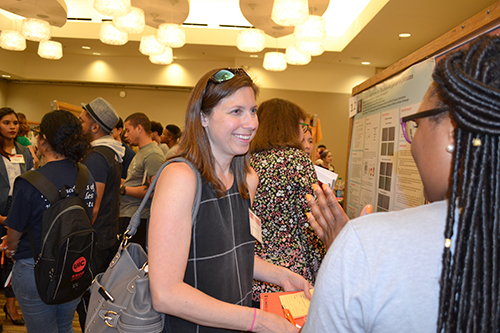 WE CAN Co-PI Michelle Green (center) chats with Naomi Waldon during the Illinois Summer Research Symposium.
WE CAN Co-PI Michelle Green (center) chats with Naomi Waldon during the Illinois Summer Research Symposium.One of the challenges of collaborating with someone from another discipline, of course, is getting past the discipline-specific jargon. Green says this echoed everything that happened with them. In fact, she admits coming into it with a bit of trepidation. “Because when I was looking at the list of people to talk to, I was like, ‘Oh boy.’ He’s in [agricultural] engineering; he’s an engineer, we’re probably not going to understand anything he has to talk about, or any of his research or anything. I’m going to go talk to him anyways, and I’ll ask my silly questions.”
“But then, that works both ways,” Davidson adds. “It works both ways,” Green agrees, adding that their project fostered cross-discipline collaboration. “So part of it is teaching our fellows that they do have something to contribute even if they’re not an engineer. So there’s power in a diverse group of people.”
Davidson explains that generally in science and research, much of the current, cutting-edge research is at the intersection of disciplines: “We’re finding that most of the cool stuff nowadays is at the intersection of disciplines. Most of the discipline-specific work has been done, so now you have to think about how those overlapping areas work together.”
What with the emphasis on the intersection of engineering and agriculture, the international service component, plus research, it's no wonder the USDA was intrigued. What’s not to love?
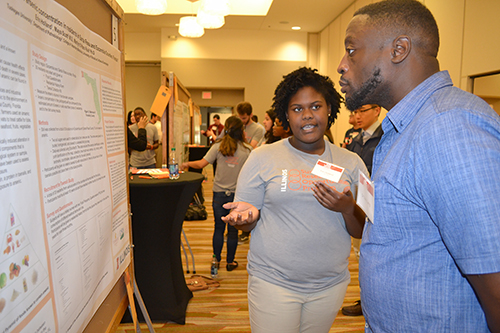 WE CAN REU participant, Erin Holland, explaining her research to a visitor to the Symposium.
WE CAN REU participant, Erin Holland, explaining her research to a visitor to the Symposium.According to Davidson, one sticking point was the small number of students impacted. “I think the hesitation was that we’re not able to train a large amount of students. We’re investing a huge amount of money in a small number of students, but the experiences they’re getting are unmatched.”
Whether or not the funder will get a lot of bang for their buck, i.e., the students will end up in grad school/careers in Agriculture-related fields, it’s too early to say.
One of the six just graduated and is starting grad school here in the fall in Natural Resources and Environmental Sciences. However, the USDA wanted WE CAN to recruit fairly young students—freshmen and sophomores. “So you get them right away interested in research and show them what’s possible within the field of agriculture,” Green explains.
Green adds that the fellows are doing a lot of exploring right now to figure out what they’re going to go into. “Our job was to give them a lot of experiences so that they could see that what they’re interested in actually does connect to agriculture, and to keep them aware of that so that they know that there are opportunities for them.”
Even if they were interested in, say, human health, Green explains that what happens in agriculture can certainly influence what happens in other fields. So the idea was to help the students understand that, in hopes that down the road, they might choose a career in an ag-related field.
What were some of the other benefits for participants? On top of the field trips, traveling abroad, and the research opportunity, they also earned a stipend. Plus, to go along withal the great stuff to add to their resumes, they’ve been promised a couple of really good letters of reference. “So Michelle and I, either one or both, would write glowing letters at this point, because they’ve been phenomenal,” Davidson explains.
Green cites a couple of other things have gained through the experience. “These young women, hopefully we’re giving them everything they need for self-confidence, and networking, and skills to go forward with the career plans. But they are all smiles now,” she adds. “It’s fun to have them back for the second year.”
Story and photos by Elizabeth Innes, Communications Specialist, I-STEM Education Initiative
For more about the WE CAN REU, see:
More: REU, Summer Research, Undergrad, 2018













.jpg)
















